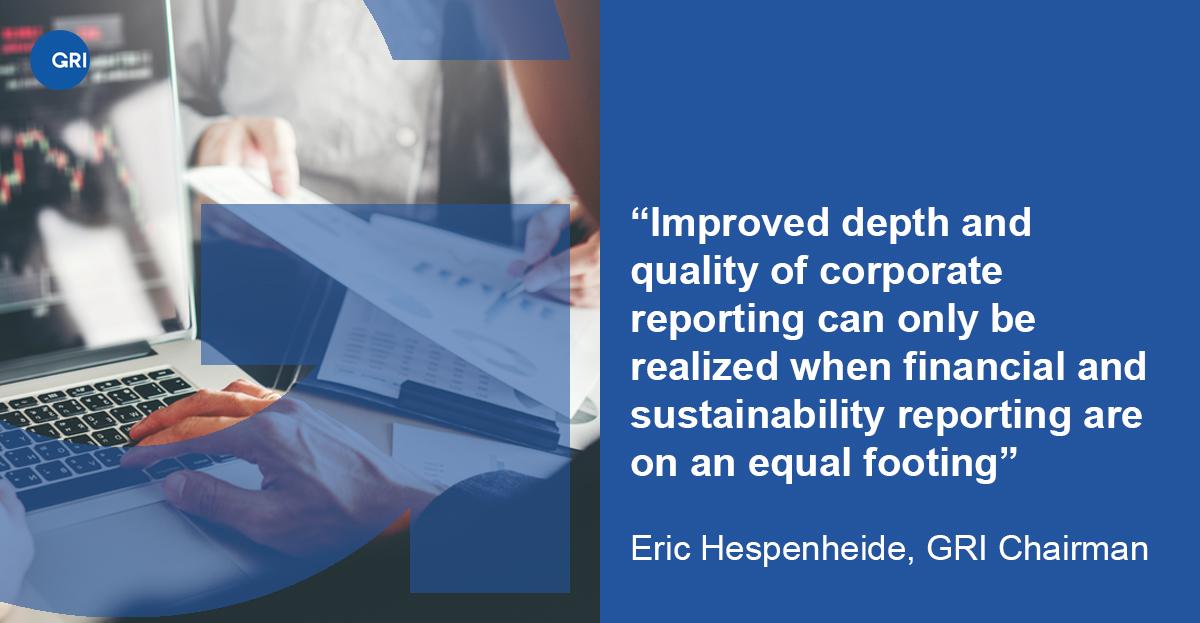Financial and Sustainability Reporting Must Be Given Equal Footing
GRI responds to IFRS consultation paper on sustainability reporting

December 14, 2020 /3BL Media/ - GRI has called for strengthened financial reporting that complements sustainability reporting and takes account of the financial risks and opportunities related to a company’s sustainability impacts – with mandatory disclosure to ensure transparency on corporate contributions to global challenges.
The proposals are included in GRI’s response to the International Financial Reporting Standards (IFRS) Foundation consultation on its potential role in sustainability reporting standards.
As the provider of the most widely used sustainability reporting standards, adopted by a majority of large companies around the world, GRI has a unique and informed perspective on the challenges associated with developing sustainability related standards.
The key issues addressed by GRI are:
- For sustainability reporting to contribute to better decision-making, reporting needs to transition from voluntary practices to mandatory requirements. This is necessary to enable higher comparability and transparency, ensuring the same level of consistency and rigor for sustainability disclosures as applied to financial reporting.
- Financial reporting itself must be strengthened to reflect the implications of sustainability issues. This not only recognizes the financial consequences on the company of sustainability risks and opportunities, it acknowledges the crucial role of the private sector in addressing global challenges.
- A new corporate reporting regime is needed in which financial and sustainability reporting is given equal footing. GRI will work with the IFRS Foundation and others to realize this transition, including undertaking joint standard-setting efforts.
Eric Hespenheide, Chairman of GRI, said:
“GRI sees IFRS as a crucial partner in ensuring a seamless link between financial and sustainability reporting. Therefore, we fully support the IFRS Trustees in their objective to improve financial reporting so it is inclusive of the financial risks and opportunities presented by a company’s sustainability impacts.
The interconnection between financial and sustainability reporting deserves particular attention by the IFRS, and is an area I believe we can closely collaborate on. It is essential to limit the burden on businesses while at the same time ensuring enhanced reporting that illuminates corporate impacts.
Improved depth and quality of reporting can only be realized when financial and sustainability reporting are on an equal footing – with mandatory disclosure requirements for both. Furthermore, we cannot achieve the UN Sustainable Development Goals, the EU Green Deal, or other regional and global commitments, without accounting for the contribution of companies.
GRI’s vision is of a sustainable future that is supported by global sustainability reporting standards, which inform all stakeholders – from investors through to civil society, policy makers, labor unions and others. We stand ready to work with the IFRS Foundation to achieve this aim.”
The IFRS consultation paper, which considers ways the Foundation might contribute to the development and governance of global sustainability standards, is open until 31 December. View GRI’s response to the IFRS.
GRI welcomes the IFRS Trustees’ commitment to build upon and work with existing initiatives. We encourage them to reflect on the comprehensive reporting statement from GRI, CDP, CDSB, IIRC and SASB, which supports the consolidation of reporting requirements.
The KPMG Survey of Sustainability Reporting 2020 (published 1 December) identified that a record 80% of 5,200 leading companies across 52 countries now voluntarily undertake sustainability reporting, with 67% using GRI. Almost all (96%) of the world’s largest 250 companies report their sustainability performance, of which three in four adopt the GRI Standards.
The 2020 edition of Carrots & Sticks, the flagship resource on non-financial and sustainability reporting regulations, revealed a significant global trend of increased disclosure requirements and policies around the world.
Global Reporting Initiative (GRI) is the independent, international organization that helps businesses and other organizations take responsibility for their impacts, by providing them with the global common language to report those impacts. The GRI Standards are developed through a multi-stakeholder process and made available as a free public good.

